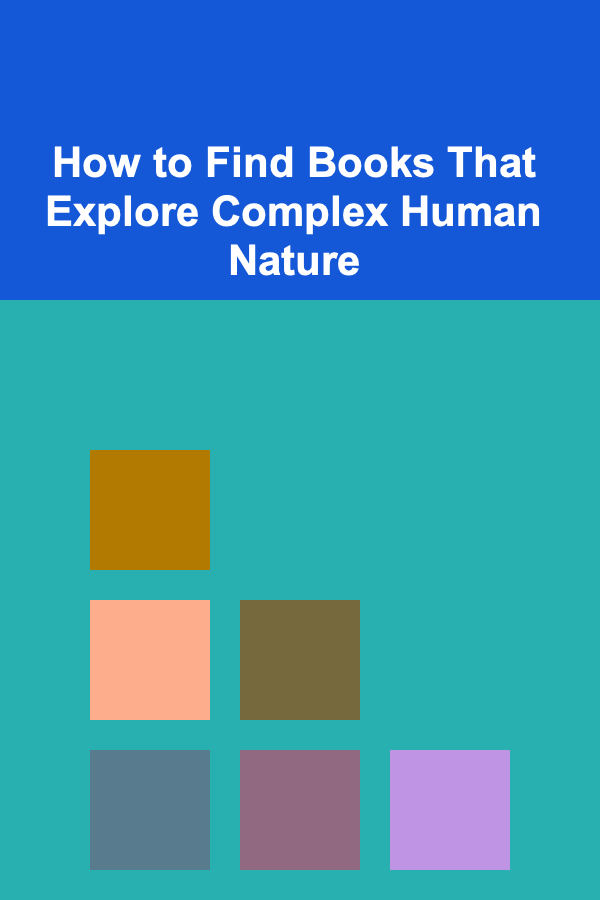
How to Find Books That Explore Complex Human Nature
ebook include PDF & Audio bundle (Micro Guide)
$12.99$7.99
Limited Time Offer! Order within the next:

Human nature is a multifaceted and often elusive concept. It includes the deep-seated psychological, emotional, and social traits that define us as human beings. Over the centuries, countless writers, philosophers, and psychologists have attempted to unravel its complexities. For those interested in delving into the profound layers of human behavior, motivations, and interactions, literature provides an excellent lens through which to examine the intricacies of the human condition.
But how do we find books that explore this complex terrain? The process of identifying such works requires an understanding of the types of literature that engage with the darker, more nuanced aspects of humanity. In this article, we will discuss how to find books that delve into complex human nature, explore the themes that define such books, and provide recommendations that cater to various tastes and interests.
Understanding Complex Human Nature in Literature
Before diving into how to find books that explore complex human nature, it's essential to define what we mean by "complex human nature." It refers to the intricate web of psychological and emotional processes that govern human actions, including the contradictory, sometimes paradoxical behaviors that define us as individuals and as members of society. It includes:
- The tension between good and evil: Humans are capable of both immense kindness and cruelty, and literature often explores the reasons behind such extremes.
- The search for identity: Many literary works center around individuals struggling with questions of who they are and their place in the world.
- Moral dilemmas: Complex characters often face situations that challenge their ethical beliefs, leading them to make difficult, sometimes contradictory, decisions.
- Emotional depth: Human beings experience a vast spectrum of emotions, from love and joy to guilt, despair, and regret, and literature often delves into the emotional complexities of the human experience.
- Interpersonal relationships: The way people interact with others, including family dynamics, friendships, and romantic relationships, is central to understanding human nature.
Books that explore these themes do not offer simple answers or solutions but instead challenge readers to confront the complexity and ambiguity of human existence.
Identifying Literary Genres That Explore Human Nature
Several literary genres are particularly adept at exploring the intricacies of human nature. Understanding which genres offer the best exploration of complex human behavior can help you find books that cater to your interests.
a. Literary Fiction
Literary fiction is perhaps the most obvious genre for exploring complex human nature. Unlike genre fiction, which is often more plot-driven, literary fiction focuses heavily on character development, emotional depth, and the exploration of complex themes. Writers in this genre are often interested in the internal struggles and psychological complexities of their characters, using narrative techniques that challenge the reader's perception of reality and human experience.
Key Characteristics of Literary Fiction:
- Character-driven narratives
- In-depth psychological exploration
- Focus on themes of identity, morality, and existential questions
- Ambiguous or open-ended conclusions
Authors such as Leo Tolstoy , Virginia Woolf , and James Joyce are renowned for their exploration of human nature through literary fiction.
b. Psychological Fiction
Psychological fiction, as the name suggests, places a heavy emphasis on the inner workings of the human mind. These books often delve into the psychology of their characters, exploring their motivations, fears, desires, and neuroses. Psychological fiction examines the complexity of human nature by focusing on how individuals perceive and react to the world around them, often through the lens of their own psychological struggles.
Key Characteristics of Psychological Fiction:
- Exploration of the subconscious mind
- Introspective narratives
- Focus on mental health, trauma, and internal conflict
- Unreliable narrators or distorted realities
Authors like Dostoevsky , Sylvia Plath , and Franz Kafka excel in psychological fiction, using deep character studies to explore the darker aspects of human nature.
c. Philosophical Fiction
Philosophical fiction merges literature with philosophy, using storytelling to explore fundamental questions about life, morality, existence, and the nature of humanity. These books often center on characters grappling with existential dilemmas, questions of free will, the search for meaning, and the complexities of ethical decision-making.
Key Characteristics of Philosophical Fiction:
- Deep engagement with philosophical ideas
- Characters confronting existential or moral crises
- Exploration of human nature through questions of ethics, free will, and the meaning of life
Philosophical fiction can be challenging, but it offers readers a profound exploration of human nature. Notable authors include Albert Camus , Søren Kierkegaard , and Jean-Paul Sartre.
d. Historical Fiction
Historical fiction provides a window into the past, often shedding light on the complexities of human nature in different eras. These novels offer an exploration of how historical events, cultural contexts, and societal norms influence individual behavior, relationships, and moral decision-making.
Key Characteristics of Historical Fiction:
- Exploration of human nature through historical events
- Complex social and political contexts
- Emphasis on how individuals navigate their environment
Books like Ken Follett's "The Pillars of the Earth" and Hilary Mantel's "Wolf Hall" explore the intersection of personal and societal history, providing insight into the human experience during pivotal moments in time.
e. Classic Novels
Classic novels, regardless of genre, often feature deep explorations of human nature. These works, which have stood the test of time, frequently tackle timeless themes such as love, loss, power, guilt, and redemption. The complexity of the characters and the ethical quandaries they face are often central to the story.
Key Characteristics of Classic Novels:
- Timeless themes and moral dilemmas
- Rich character development
- Exploration of the human condition across various contexts
Authors such as Homer , Jane Austen , and Charles Dickens are considered masters of exploring the depths of human nature through their novels.
Tips for Finding Books That Explore Complex Human Nature
Now that we understand the types of genres and literary traditions that delve into the complexities of human nature, let's explore some strategies to help you find books that explore these themes in-depth.
a. Read Book Reviews and Recommendations
One of the best ways to find books that explore complex human nature is by reading book reviews and recommendations. Literary critics, bloggers, and book clubs often provide in-depth analyses of books, highlighting their themes, character development, and psychological depth. Websites like Goodreads , The New York Times Book Review, and literary magazines often feature books that engage with profound human themes.
Look for reviews that discuss:
- Character complexity
- Psychological depth
- Exploration of moral or existential dilemmas
- Thought-provoking themes
b. Explore Author Interviews and Essays
Many authors discuss their work in interviews and essays, providing insight into their motivations, writing process, and the themes they aim to explore. Authors who delve into complex human nature often talk about their fascination with human psychology, moral ambiguity, and the human experience. Interviews with authors like Haruki Murakami , Toni Morrison , and Ian McEwan can offer valuable recommendations for books that deal with these themes.
c. Join Literary Communities and Book Clubs
Joining literary communities and book clubs can be an excellent way to discover books that explore human nature. Book clubs often have themed reading lists that focus on books with deep psychological insights or philosophical questions. Engaging with other readers who share your interest in complex literature can lead to valuable book recommendations.
d. Use Online Book Databases
Online book databases like Goodreads and LibraryThing allow users to search for books based on specific themes, genres, and keywords. These platforms often have lists of books categorized by themes like "psychological fiction," "literary classics," or "moral dilemmas," making it easy to find books that align with your interests.
e. Explore the Works of Famous Authors
Certain authors are well-known for their exploration of complex human nature. Delving into their body of work can give you a wealth of material to explore. Some authors to consider include:
- Fyodor Dostoevsky -- Known for his deep psychological and philosophical explorations in novels like Crime and Punishment and The Brothers Karamazov.
- Virginia Woolf -- Famous for her modernist explorations of consciousness and identity in works like Mrs. Dalloway and To the Lighthouse.
- Franz Kafka -- Renowned for his surreal and existential explorations of bureaucracy, isolation, and identity in The Trial and The Metamorphosis.
- Toni Morrison -- Known for her exploration of race, identity, and trauma in books like Beloved and Song of Solomon.
f. Read Translations of Foreign Literature
Foreign literature often offers fresh perspectives on human nature. Writers from different cultures may approach complex emotional and psychological themes from angles that are unfamiliar, offering new insights into the human condition. Translated works from authors like Gabriel García Márquez , Haruki Murakami , and Jorge Luis Borges provide a wealth of exploration into human nature from non-Western perspectives.
Conclusion
Finding books that explore complex human nature is a rewarding journey that leads to a deeper understanding of the intricacies of human behavior, emotions, and relationships. Whether you are drawn to literary fiction, psychological explorations, philosophical musings, or historical narratives, literature offers a rich tapestry of stories that delve into the heart of what it means to be human.
By exploring different genres, seeking out author recommendations, and engaging with literary communities, you can uncover a vast array of books that challenge your perceptions, stimulate your thinking, and illuminate the many facets of human nature. Reading these works not only broadens our understanding of others but also helps us reflect on our own behavior, motivations, and place in the world.

How to Achieve the Perfect Lighting for Movie Nights
Read More
How to Use Magnetic Strips for Small Spice Jars
Read More
How to Discover Series That Have a Strong Fanbase
Read More
Selecting and Styling Outdoor Living Spaces: A Comprehensive Guide
Read More
Mastering the Future of Innovation
Read More
10 Steps for a Beginner's Fitness To-Do List
Read MoreOther Products

How to Achieve the Perfect Lighting for Movie Nights
Read More
How to Use Magnetic Strips for Small Spice Jars
Read More
How to Discover Series That Have a Strong Fanbase
Read More
Selecting and Styling Outdoor Living Spaces: A Comprehensive Guide
Read More
Mastering the Future of Innovation
Read More